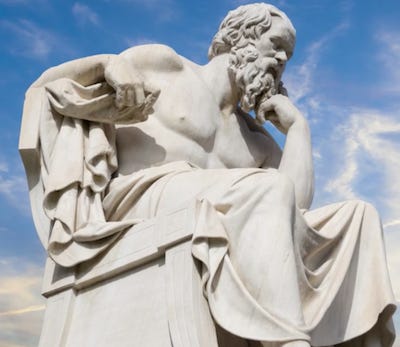
When Aristotle alludes "some" holding the Good "to be something by itself, other than and beside these many good things, which is in fact to all these the cause of their being good," (N.E. I.ii.) is this a nod to his teacher Plato? Aristotle, in contrast with his teacher, argues that "substance is prior in the nature of tings to that which is relative" and posits that the Good's predication in the category of Substance is "as God, Intellect" (N.E. I. iii.). What does he mean by this? I thought that, for Aristotle (unlike Plato), primary substance was material—both God and Intellect seem to be purely conceptual. Yet, later on, Aristotle says that the idea of the Good "cannot be the object of human action or attainable by Man" (N.E. I. iii.). Is this not in conflict with his regard for the Intellect as belonging to the category of Substance? Alternatively, is it the case that not everything belonging to Aristotle's Substance category is, well, substantive in the material-observable way? Aristotelian metaphysics confuse me!
Metaphysics aside, Aristotle contends that "a man is not a good man at all who feels no pleasure in noble actions" (N.E. I. vi.). That is, Aristotle drives a wedge between right conduct and moral worthiness. In Aristotle's ethics, then, a man can be blameless in action—do nothing wrong-impermissible—and yet be of low moral character because he does not actively delight in performing the good. I believe this distinction captures an important difference between those who willfully perform virtue and those who do begrudgingly, but I'm not quite sure how to articulate my case.
Back to metaphysics: I recall from Prof. Thomas's Phil 11 course that human souls are hylomorphic compound of the Rational (associated with the intellect) and the Irrational (associated with morality?). This sounds like a bipartite conception of man (as opposed to Plato's tripartite model). However, Aristotle goes on to subdivide the Rational in two: "the one supremely and in itself, the other paying it a kind of filial regard" (N.E. I. xi.i). He does the same with the Irrational: "the merely vegetative has no share of Reason, but that of desire, or appetition generally, does partake of it" (N.E. I. xi.). What is the motivation for this double-bipartite scheme? To me, it seems as if Aristotle subdivides his two parts of the soul to handle the interaction between the Rational and the Irrational that Plato's spirited part performs in the older, tripartite model. What say you, classmates?



